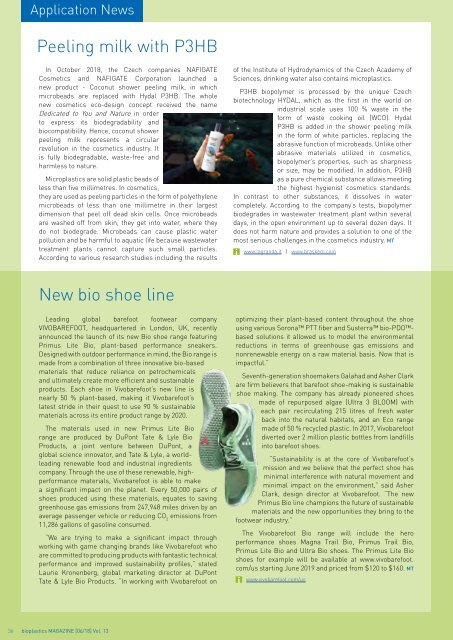Issue 06/2018
bioplasticsMAGAZINE_1806
bioplasticsMAGAZINE_1806
You also want an ePaper? Increase the reach of your titles
YUMPU automatically turns print PDFs into web optimized ePapers that Google loves.
Application AutomotiveNews<br />
Peeling milk with P3HB<br />
In October <strong>2018</strong>, the Czech companies NAFIGATE<br />
Cosmetics and NAFIGATE Corporation launched a<br />
new product - Coconut shower peeling milk, in which<br />
microbeads are replaced with Hydal P3HB. The whole<br />
new cosmetics eco-design concept received the name<br />
Dedicated to You and Nature in order<br />
to express its biodegradability and<br />
biocompatibility. Hence, coconut shower<br />
peeling milk represents a circular<br />
revolution in the cosmetics industry. It<br />
is fully biodegradable, waste-free and<br />
harmless to nature.<br />
Microplastics are solid plastic beads of<br />
less than five millimetres. In cosmetics,<br />
they are used as peeling particles in the form of polyethylene<br />
microbeads of less than one millimetre in their largest<br />
dimension that peel off dead skin cells. Once microbeads<br />
are washed off from skin, they get into water, where they<br />
do not biodegrade. Microbeads can cause plastic water<br />
pollution and be harmful to aquatic life because wastewater<br />
treatment plants cannot capture such small particles.<br />
According to various research studies including the results<br />
of the Institute of Hydrodynamics of the Czech Academy of<br />
Sciences, drinking water also contains microplastics.<br />
P3HB biopolymer is processed by the unique Czech<br />
biotechnology HYDAL, which as the first in the world on<br />
industrial scale uses 100 % waste in the<br />
form of waste cooking oil (WCO). Hydal<br />
P3HB is added in the shower peeling milk<br />
in the form of white particles, replacing the<br />
abrasive function of microbeads. Unlike other<br />
abrasive materials utilized in cosmetics,<br />
biopolymer’s properties, such as sharpness<br />
or size, may be modified. In addition, P3HB<br />
as a pure chemical substance allows meeting<br />
the highest hygienist cosmetics standards.<br />
In contrast to other substances, it dissolves in water<br />
completely. According to the company’s tests, biopolymer<br />
biodegrades in wastewater treatment plant within several<br />
days, in the open environment up to several dozen days. It<br />
does not harm nature and provides a solution to one of the<br />
most serious challenges in the cosmetics industry. MT<br />
www.lagranda.it | www.braskem.com<br />
New bio shoe line<br />
Leading global barefoot footwear company<br />
VIVOBAREFOOT, headquartered in London, UK, recently<br />
announced the launch of its new Bio shoe range featuring<br />
Primus Lite Bio, plant-based performance sneakers.<br />
Designed with outdoor performance in mind, the Bio range is<br />
made from a combination of three innovative bio-based<br />
materials that reduce reliance on petrochemicals<br />
and ultimately create more efficient and sustainable<br />
products. Each shoe in Vivobarefoot’s new line is<br />
nearly 50 % plant-based, making it Vivobarefoot’s<br />
latest stride in their quest to use 90 % sustainable<br />
materials across its entire product range by 2020.<br />
The materials used in new Primus Lite Bio<br />
range are produced by DuPont Tate & Lyle Bio<br />
Products, a joint venture between DuPont, a<br />
global science innovator, and Tate & Lyle, a worldleading<br />
renewable food and industrial ingredients<br />
company. Through the use of these renewable, highperformance<br />
materials, Vivobarefoot is able to make<br />
a significant impact on the planet. Every 50,000 pairs of<br />
shoes produced using these materials, equates to saving<br />
greenhouse gas emissions from 247,948 miles driven by an<br />
average passenger vehicle or reducing CO 2<br />
emissions from<br />
11,286 gallons of gasoline consumed.<br />
“We are trying to make a significant impact through<br />
working with game changing brands like Vivobarefoot who<br />
are committed to producing products with fantastic technical<br />
performance and improved sustainability profiles,” stated<br />
Laurie Kronenberg, global marketing director at DuPont<br />
Tate & Lyle Bio Products. “In working with Vivobarefoot on<br />
optimizing their plant-based content throughout the shoe<br />
using various Sorona PTT fiber and Susterra bio-PDObased<br />
solutions it allowed us to model the environmental<br />
reductions in terms of greenhouse gas emissions and<br />
nonrenewable energy on a raw material basis. Now that is<br />
impactful.”<br />
Seventh-generation shoemakers Galahad and Asher Clark<br />
are firm believers that barefoot shoe-making is sustainable<br />
shoe making. The company has already pioneered shoes<br />
made of repurposed algae (Ultra 3 BLOOM) with<br />
each pair recirculating 215 litres of fresh water<br />
back into the natural habitats, and an Eco range<br />
made of 50 % recycled plastic. In 2017, Vivobarefoot<br />
diverted over 2 million plastic bottles from landfills<br />
into barefoot shoes.<br />
“Sustainability is at the core of Vivobarefoot’s<br />
mission and we believe that the perfect shoe has<br />
minimal interference with natural movement and<br />
minimal impact on the environment,” said Asher<br />
Clark, design director at Vivobarefoot. “The new<br />
Primus Bio line champions the future of sustainable<br />
materials and the new opportunities they bring to the<br />
footwear industry.”<br />
The Vivobarefoot Bio range will include the hero<br />
performance shoes Magna Trail Bio, Primus Trail Bio,<br />
Primus Lite Bio and Ultra Bio shoes. The Primus Lite Bio<br />
shoes for example will be available at www.vivobarefoot.<br />
com/us starting June 2019 and priced from $120 to $160. MT<br />
www.vivobarefoot.com/us<br />
36 bioplastics MAGAZINE [<strong>06</strong>/18] Vol. 13


















